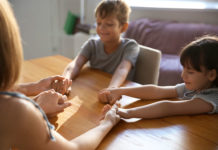Recently I published a post about focusing on what you want more of. I got several private messages with questions and what-if situations. Much of the people wanted to know more about controlling children’s behaviors by the way you speak.
What Not to Say
- “Okay?” at the end of a command or request. When you tell a child what you want them to do and then add “Okay?” with your voice rising at the end, you are really asking the child’s permission. “Time to clean up now. Okaaaay?” Take the word “okay” out of your conversations when dealing with discipline.
- “I’m sorry. You can’t jump over chairs.” Somewhere along the way, adults started apologizing when we were trying to correct a child’s behavior. I can’t remember why we were supposed to start a conversation with “I’m sorry.” The kids don’t really care if we are sorry or not. It really has nothing to do with their behavior. Some kids will figure out pretty fast that they have the power to make us, the adults, sorry. It is not wise to give unruly kids that much power!
- “I need for you to _______” or “I want you to ______.” Most children don’t have the thinking skills to be empathetic to your needs and wants. They are self-centered and want what they want. If you use the “need for you to” or the “want you to” conversations, more than likely you’ll get an argument. Also, your brain takes you literally to what it hears. If you say, “I need for you to _______,” the word “need” takes you literally to YOUR NEED. When the child doesn’t comply with your need, you become frustrated and or aggravated as your brain reacts.The same is true for the “I want you to” in that your brain hears what you want to happen.
- Never ask a child a question when you already know the answer. For example, you see one child hit another child. You walk over and say, “Did you hit her?” The child is going to say “no.” Then where do you go with the conversation? Do you tell the child you saw him hit the girl? The child will say you lied. You will have lost this conversation before you got started. Simply say, “Whoa! What happened here?” Or tell it like you saw it: “You must have been very angry to hit Ella like that. What’s going on?” When you do it this way, you open the door to a conversation with the child. You will become more likely to help the child rather than just punish the child.
Ask someone to shadow you to see if you are habitually saying some of the phrases listed above. Sometime we just don’t realize we have formed these habits or that some of the discipline techniques we learned years ago just don’t work with today’s kids.
Assertive, “This Is the Way It Is” Voice
How do you find your own assertive, “this is the way it is” voice? Dr. Becky Bailey with “Conscious Discipline” has a great idea. She says to do the following:
As you approach a child, you look at the surroundings and concentrate on them, and then add in the child’s name and situation. For example, say the first two phrases silently to yourself and then the third phrase out loud: The carpet is green. The chair is blue. “Zach, sit down.”
The “Zach, sit down” will come out in a “this is the way it is” voice. You’re not mad, upset or looking for an argument.
I was explaining this to a young children’s minister one time, and she said, “Hey, I’m going to try that on my husband tonight. He is always on the computer, and he ignores me when it’s time to come to dinner.” She used it, and she found her “this is the way it is” voice.
Practice this technique a few times. You’ll be amazed at how simple it and easy it is. With practice, it becomes natural and automatic.
Keeping It Short
In a group situation or when working with a child who has experienced a crisis of some sort, keep it short. Say the child’s name and the verb.
- “Kira, sit down.”
- “Nelson, eat slower.”
- “Emmi, shut down the computer.”
- “Isaiah, walk.”
For some children when they make a mistake, just acknowledge the mistake and move on. Make eye contact, shrug your shoulders and give a look that says, “So you blew it.” There are no repercussions, just some attention and validation that says, “Hey you messed up. Now shake it off and try again.” After all, don’t we get second chances with God when we mess up? Can we do any less for the very children that He loves and has sent to us?













